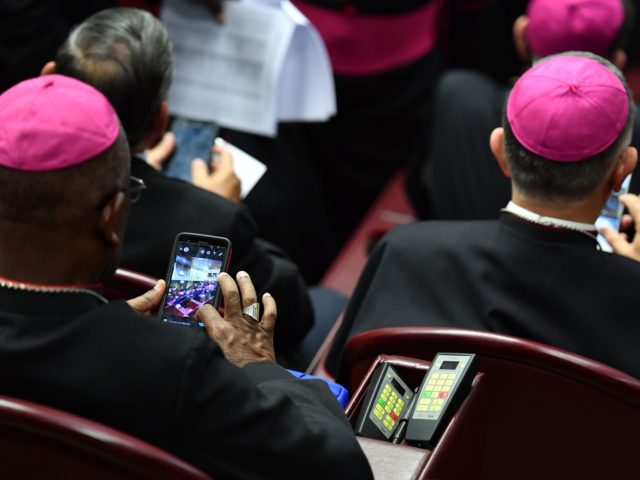Location-based homosexual and heterosexual hookup apps are widely used within Vatican walls, an investigative report revealed late Tuesday, which can open the Holy See to blackmail and other security risks.
The report by the Pillar, an online Catholic news agency, raised particular concerns of vulnerability to China, which until 2020 owned the gay hookup app Grindr, one of the services whose use in the Vatican was uncovered.
The Pillar revealed that at least 16 different mobile devices emitted signals from Grindr on at least four days between March and October 2018 within the areas of the Vatican City State not open to the public.
Vatican watchers have been at a loss to explain why the Vatican and Pope Francis himself have been so recalcitrant in not calling out the egregious human rights abuses perpetrated by the Chinese Communist Party (CCP) and why the Holy See entered into an unfavorable agreement with the CCP in 2018 ceding some decision-making power in the naming of Catholic bishops to Beijing.
“As more and more nations have expressed their concern about the growing evidence of concentration camps and even genocide in the Chinese province of Xinjiang, there has been silence from the one entity that has the whole of suffering humanity at the core of its mission. I refer to the Holy See,” wrote a mystified Dominic Lawson in the Sunday Times in 2020.
The Grindr app was “acquired by the Chinese gaming firm Beijing Kunlun Tech in 2016 for $93 million,” the Pillar report states, and was only sold to a U.S.-based company in 2020, under pressure from the U.S. government that had flagged Grindr’s Chinese ownership “a national security risk.”
The report suggests a high degree of probability that Grindr data from its 27 million users would have been shared with the Chinese government during the four years under Chinese ownership, information that could include “user details, private messages exchanged between users, and evidence of sexual liaisons arranged between users.”
As Breitbart News reported in July 2020, cyber hackers tied to the Chinese government were able to successfully infiltrate the Vatican’s computer networks in the months leading up to a renegotiation of the 2018 accord on the appointment of bishops in China.
The U.S.-based cybersecurity firm Recorded Future found that hackers had targeted the Vatican and the Holy See’s Study Mission to China, a group of Hong Kong-based Vatican diplomats who have been negotiating the Church’s status in China.
In June 2019, the Holy See also changed its longstanding policy of forbidding Catholic priests from joining the state-run Chinese Catholic Patriotic Association (CCPA), which was set up under the rule of Chairman Mao Zedong as a parallel church to the church in Rome.
Cardinal Joseph Zen, a vocal critic of the Vatican’s 2018 deal with the CCP over the appointment of bishops, said that deal was not nearly as destructive as the “Pastoral Guidance” issued by the Vatican allowing Catholic clerics to enlist in the CCPA.
In comparison, the pastoral guidance “is more blatantly evil, immoral, because it legitimizes a schismatic Church!” Zen wrote in March 2020.
Since the signing of the original Vatican-China deal in 2018, Catholic in China — especially those belonging to the unofficial “underground Church faithful to Rome — have suffered intensified persecution, according to numerous reports.
“While the Vatican has reached a provisional agreement with China on the issue of episcopal appointments, reports of persecution by the Chinese government persist as underground churches are closed and their priests detained, crosses destroyed, bibles confiscated, and children under 18 forbidden from attending Mass and receiving religious instruction,” the U.S. bishops said in June 2020.
Beijing has come under growing international criticism for the mass imprisonment in “reeducation camps” of more than one million Uighurs in the Xinjiang Autonomous Region, where reports of compulsory sterilization, forced abortions, torture, and ethnic cleansing have become frequent.
“The CCP has also been credibly accused of forcibly aborting and sterilizing Uyghur women in the hundreds of thousands, as well as committing infanticide of full-term babies born outside of the family planning limits,” declared human rights champion Reggie Littlejohn in March 2021.

COMMENTS
Please let us know if you're having issues with commenting.